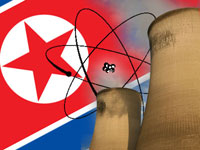Pitfalls quite possible in recent arms agreements with North Korea, U.S. official says
The U.S. official who signed an earlier deal halting North Korea's nuclear weapons development stated Monday that pitfalls remain in the latest accord with Pyongyang despite recent hopeful signs.

Details of how to implement recent agreements from international arms talks have not been clearly laid out - leaving potential room for North Korea to find loopholes that could leave it still holding material to make nuclear bombs, Robert Gallucci said.
Also, the recent revitalization of ties between North and South Korea after a summit of their leaders last month will only foster peace on the divided peninsula if there is continued movement toward disarmament, he said.
"The contribution of the summit to peace and prosperity on the peninsula will still be limited by the pace and progress of efforts to implement" agreements from the arms talks, Gallucci, dean of the school of foreign service at Georgetown University in Washington, told an international conference on the summit.
As an American diplomat, Gallucci signed a 1994 deal with North Korea that collapsed in late 2002 amid allegations Pyongyang was secretly developing a secret uranium enrichment program, in addition to its known plutonium program. Either material can be used to make bombs.
The standoff led to six-nation nuclear talks with the North - also including China, Japan, Russia, South Korea and the U.S. - which achieved their first tangible progress this summer when North Korea shut down its sole operating nuclear reactor. The North is moving by year-end to disable its nuclear facilities so they cannot easily be restarted.
Gallucci conceded that recent agreements from the arms talks went farther than the 1994 accord, by calling for nuclear facilities to be disabled rather than just frozen.
Still, he specified a list of unresolved details that could prove troublesome in ridding the communist nation of the world's deadliest weapons.
For example, he estimated the North has about 40 kilograms (88.2 pounds) of plutonium left after its first-ever nuclear test last year _ but questioned what the U.S. and others will do if the North Koreans do not declare the full amount.
Also, it is not yet known how other countries will be allowed to verify the North has fully disclosed its nuclear programs, as it is set to do in a declaration by year-end.
"In light of the North's past record on compliance, if provisions for inspections are clearly inadequate, it will be a great disappointment," Gallucci said.
Subscribe to Pravda.Ru Telegram channel, Facebook, RSS!


